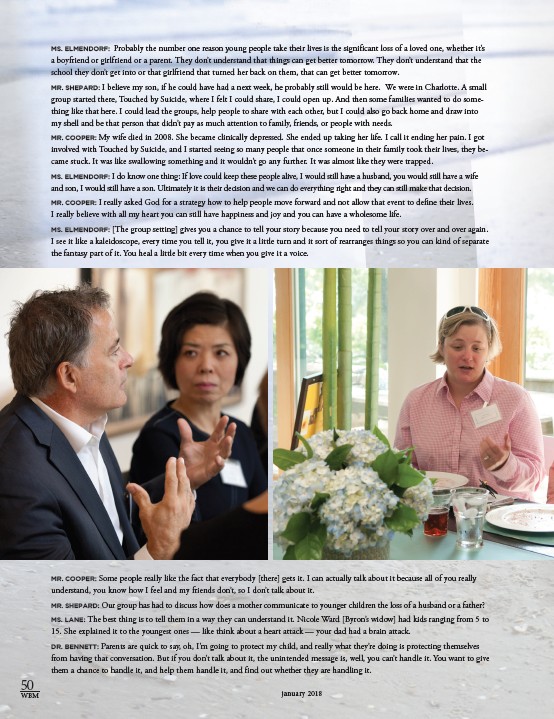
MS. ELMENDORF: Probably the number one reason young people take their lives is the significant loss of a loved one, whether it’s
a boyfriend or girlfriend or a parent. They don’t understand that things can get better tomorrow. They don’t understand that the
school they don’t get into or that girlfriend that turned her back on them, that can get better tomorrow.
MR. SHEPARD: I believe my son, if he could have had a next week, he probably still would be here. We were in Charlotte. A small
group started there, Touched by Suicide, where I felt I could share, I could open up. And then some families wanted to do some-thing
like that here. I could lead the groups, help people to share with each other, but I could also go back home and draw into
my shell and be that person that didn’t pay as much attention to family, friends, or people with needs.
MR. COOPER: My wife died in 2008. She became clinically depressed. She ended up taking her life. I call it ending her pain. I got
involved with Touched by Suicide, and I started seeing so many people that once someone in their family took their lives, they be-came
stuck. It was like swallowing something and it wouldn’t go any further. It was almost like they were trapped.
MS. ELMENDORF: I do know one thing: If love could keep these people alive, I would still have a husband, you would still have a wife
and son, I would still have a son. Ultimately it is their decision and we can do everything right and they can still make that decision.
MR. COOPER: I really asked God for a strategy how to help people move forward and not allow that event to define their lives.
I really believe with all my heart you can still have happiness and joy and you can have a wholesome life.
MS. ELMENDORF: The group setting gives you a chance to tell your story because you need to tell your story over and over again.
I see it like a kaleidoscope, every time you tell it, you give it a little turn and it sort of rearranges things so you can kind of separate
the fantasy part of it. You heal a little bit every time when you give it a voice.
MR. COOPER: Some people really like the fact that everybody there gets it. I can actually talk about it because all of you really
understand, you know how I feel and my friends don’t, so I don’t talk about it.
MR. SHEPARD: Our group has had to discuss how does a mother communicate to younger children the loss of a husband or a father?
MS. LANE: The best thing is to tell them in a way they can understand it. Nicole Ward Byron’s widow had kids ranging from 5 to
15. She explained it to the youngest ones — like think about a heart attack — your dad had a brain attack.
DR. BENNETT: Parents are quick to say, oh, I’m going to protect my child, and really what they’re doing is protecting themselves
from having that conversation. But if you don’t talk about it, the unintended message is, well, you can’t handle it. You want to give
them a chance to handle it, and help them handle it, and find out whether they are handling it.
WBM january 2018 50